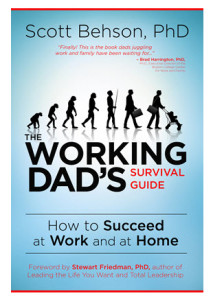Encountering people of like mind, spirit, and pursuits is one of the delights of the Internet. Scott Behson, who has contributed here for the past two years, is one of those people, which you will see in his newly published book: “The Working Dad’s Survival Guide.”
 In “The Working Dad’s Survival Guide,” Scott addresses issues that are critical to today’s families — how to manage the conflicts that many dual-income parents face, the mixed messages that fathers receive in their work environments when actively involved in their children’s lives, and opportunities for improvement in terms of employment policies, social infrastructure, and more.
In “The Working Dad’s Survival Guide,” Scott addresses issues that are critical to today’s families — how to manage the conflicts that many dual-income parents face, the mixed messages that fathers receive in their work environments when actively involved in their children’s lives, and opportunities for improvement in terms of employment policies, social infrastructure, and more.
A working dad, a college professor of management, and a consultant on work-family issues, Scott shares his parenting duties with his working wife Amy. He offers stories and strategies culled from his own experience as well as from research.
When it comes to the increasing number of conflicts faced by fathers in American society, Scott writes:
While everyone’s details are different, the themes are similar. Virtually every working dad I know struggles with balancing the time and effort required to be a good financial provider with the time and effort needed to be a present, involved, loving father… We all deal with this work-family challenge in different ways — and it is never easy. But we have struggled, seemingly alone, for too long… we fail to recognize that so many dads are running themselves ragged to succeed both in their careers and in their families. A little support from employers, public policy and society would be nice.
Reflecting the widespread nature of these issues, Scott notes:
65% of dads see their role as both provider and caretaker, and 85 percent aspire to fully sharing parenting with their spouses (however only 30 percent report that they do).
85 percent aspire to fully sharing parenting. Think about that. But what do we do to encourage and facilitate this shift? Don’t we need to alter our mindsets, employment policies, social infrastructure?
In my opinion, Scott nails it when points to cultural and workplace attitudes as lagging behind a real desire to more actively participate in family life. Certainly, Gen Xers and Millennials are increasingly considering this participation “normal.”
Yet the inherent difficulties in what men (and women) want clash with the realities of work life. Those realities include employment insecurity, inflexible job structures, inadequate parental leave policies, insufficient childcare options, and gaps in supervisory skills to better manage remote or telecommuting employees.
One of the pleasures of Scott’s writing is the way he touches lovingly on his own familial situation. He uses examples from his life with wife Amy and son Nick, and how they have configured their schedules and responsibilities. In this excerpt that I particularly like, he remarks on evolving generational expectations, the impact of understanding supervisors, the importance of flexibility on one’s job, as well as the necessity of shared values and communication.
Scott explains:
When Amy and I got engaged, my well-meaning-but-from-a-different-generation relatives all met her for the first time. Several asked Amy, “Are you still going to be an actress now that you’re getting married?” At first, this question puzzled Amy. She smiled and responded with grace and humor that “Yes, and Scott is still going to be a professor.” To us, of course our lives as a married couple and future parents would include both of our careers. To our older, more traditional relatives, of course Amy’s career would be secondary to mine, and to future motherhood.
Part of the reason Amy and I have been a successful married couple/co-parents is that we fully discussed and are on the same page about how our lives together would include commitments to our family and each others’ careers. My career as a college professor, while demanding, allows for flexibility in terms of where and when work gets done, and my supervisors have been very supportive of my need for flexibility. This has allowed me to better accommodate Amy’s career; if I had a different job and a less-enlightened employer, our lives would be much harder.
Theories, research and personal stories are helpful. However, most of us need tangible strategies for achieving change and continuing to manage it, which is precisely what Scott gives us.
Highlighting both the challenges and the opportunities, not only is this an insightful guidebook to “Dad’s” survival, but to partners maintaining healthy relationships in the face of work conflicts, to negotiating the time and arrangements they need, to participating more fully in the lives of their children, and to remaining actively engaged in their work lives.
Click here to see more of Scott’s book, “The Working Dad’s Survival Guide: How to Succeed at Work and at Home,” on Amazon.
Scott Behson, PhD, is a Professor of Management at Fairleigh Dickinson University, a busy involved dad, and an overall grateful guy. He runs Fathers, Work, and Family, a blog dedicated to helping fathers better balance work and family, and encouraging more supportive workplaces. He also writes on work and family issues for Harvard Business Review (HBR) Blogs and The Good Men Project. Scott is the author of the newly released (2015) book, “The Working Dad’s Survival Guide: How to Succeed at Work and at Home.” He lives in Nyack, NY with his wife, Amy, and son, Nick. Contact him on Twitter (@ScottBehson), Facebook, LinkedIn or email.
You May Also Enjoy
Thanks so much for highlighting my book. I’m excited that it is out in the world and can help so many dads and their families!